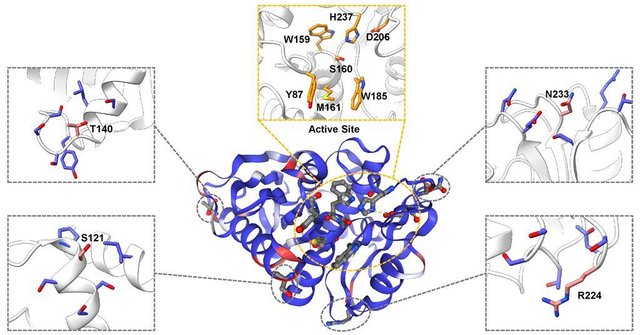
Source
We all know the enormous pollution problem posed by discarded plastics, not only because of the aesthetic impact of the rubbish or the fact that we have a plastic island in the middle of the ocean three times the size of France. The worst thing is when these plastics degrade and become micro-plastics that end up entering the food chain and therefore our bodies.
Todos sabemos el enorme problema de contaminación que plantean los plásticos desechados, no solo por el impacto estético de la basura o por el hecho de tener una isla de plástico en medio del océano tes veces el tamaño de Francia. Lo peor es cuando estos plásticos se van degradando y se convierten en micro-plásticos que acaban entrando en la cadena alimenticia y por ende en nuestros cuerpos.
That is why we urgently need developments such as those proposed at the University of Texas at Austin, where they have developed an enzyme capable of degrading PET plastic in just 24 hours. This enzyme, called FAST-PETase, has been created using a machine learning algorithm and could revolutionise plastic recycling.
Por eso necesitamos con cierta urgencia desarrollos como el planteado en la Universidad de Texas en Austin, donde han desarrollado una enzima capaz de degradar el plástico PET en tan solo 24 horas. Esta enzima, denominada FAST-PETasa, ha sido creada utilizando un algoritmo de aprendizaje automático y podría revolucionar el reciclaje de plásticos.

Source
Polyethylene terephthalate (PET) is a type of plastic commonly used in packaging and textiles due to its strength and lightness. However, its persistence in the environment has been a growing concern. To address this problem, researchers employed an AI tool called RFDiffusion, which generates protein structures from scratch.
El polietileno tereftalato (PET) es un tipo de plástico comúnmente utilizado en envases y textiles debido a su resistencia y ligereza. Sin embargo, su persistencia en el medio ambiente ha sido una preocupación creciente. Para abordar este problema, los investigadores emplearon una herramienta de IA llamada RFDiffusion, que genera estructuras de proteínas desde cero.
Using this tool, they designed 129 proteins, two of which showed catalytic activity, i.e. the ability to break down chemical bonds present in PET. To refine the design, the team used a second AI tool called PLACER. This neural network was trained with thousands of known protein structures, allowing the structural configurations of the enzymes to be adjusted and optimized.
Con esta herramienta, diseñaron 129 proteínas, de las cuales dos mostraron actividad catalítica, es decir, la capacidad de descomponer enlaces químicos presentes en el PET. Para perfeccionar el diseño, el equipo utilizó una segunda herramienta de IA denominada PLACER. Esta red neuronal se entrenó con miles de estructuras proteicas conocidas, permitiendo ajustar y optimizar las configuraciones estructurales de las enzimas.

Source
As a result, an enzyme was created that can break down PET into its basic components in a significantly reduced time, facilitating its recycling and reducing its environmental impact. This development opens up new possibilities to tackle plastic pollution through innovative biotechnological solutions, harnessing the power of artificial intelligence to design tailor-made enzymes with environmental and industrial applications.
Como resultado, se creó una enzima que puede descomponer el PET en sus componentes básicos en un tiempo significativamente reducido, facilitando su reciclaje y reduciendo su impacto ambiental. Este desarrollo abre nuevas posibilidades para abordar la contaminación plástica mediante soluciones biotecnológicas innovadoras, aprovechando el poder de la inteligencia artificial para diseñar enzimas a medida con aplicaciones ambientales e industriales.
While the FAST-PETase enzyme is still in its early stages of development, researchers believe it has the potential to transform the plastics recycling industry. In the future, this enzyme could be used to recycle all kinds of PET products, from plastic bottles to sportswear.
Si bien la enzima FAST-PETasa todavía se encuentra en sus primeras etapas de desarrollo, los investigadores creen que tiene el potencial de transformar la industria del reciclaje de plásticos. En el futuro, esta enzima podría ser utilizada para reciclar todo tipo de productos de PET, desde botellas de plástico hasta ropa deportiva.
More information/Más información
https://aibusiness.com/responsible-ai/super-recycling-ai-creates-an-enzyme-that-eats-plastics-at-record-speed